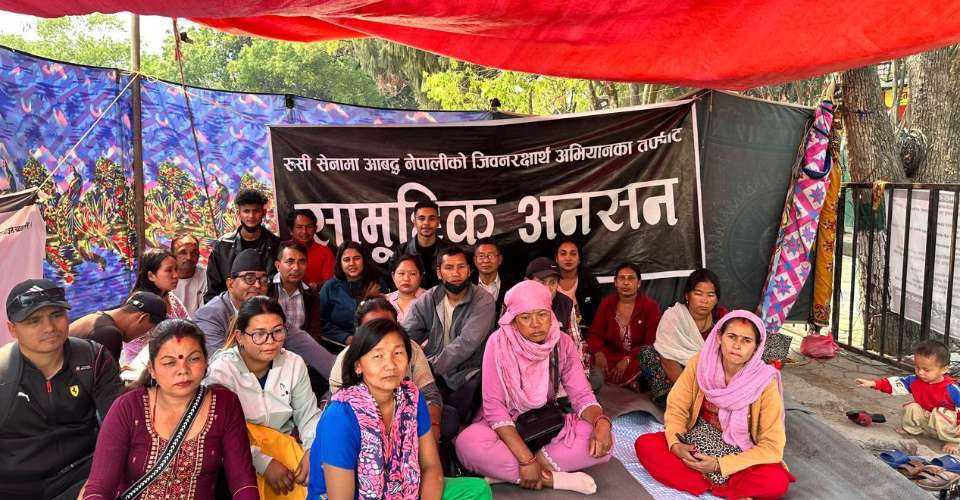
By Pragati Shahi
Bhadra Shah, a 28-year widow, sits on a traditional charpoy in front of her one-storied house in a Nepal town to nurse her five-month-old daughter while her four-year-old son plays on the veranda of her house.
The 28-year-old woman’s husband died last November while fighting for Russian army against Ukraine, thousands of miles away from her home in Tikapur, a small town in west Nepal.
Bhadra’s husband Bharat Shah, 36, was one of the hundreds of Nepali men who left the country to join the Russian military last year, thanks to a human trafficking network that lured men from Nepal with offers of high salaries up to $3,000 a month.
Besides the high salaries, they were also tempted with the prospects of Russian citizenship within a year of serving in the army and bringing their families to Russia and later settling in Europe for a better future, the woman said.
The offer was appealing for Bharat, who had worked as a traffic personnel in Nepal capital Kathmandu for a decade, and later in Dubai earning some 1200 dirhams ($326) a month.
Bharat fell for the agent’s offer and took a loan of 500,000 Nepali rupees ($3,747) to pay the agent to help him join Russian army.
He landed in Moscow on Aug. 30 last year and was taken to a recruitment camp the same day along with 30 other Nepali men who flew with him from Nepal and Dubai.
After a week’s combat training he was sent to the front line of war. Bharat was killed in the battle in Avdiivka in eastern Ukraine on Nov. 26, a Nepali colleague informed the family on Dec. 12.
“The agent duped my husband saying he would be working as an army helper in Russia,” Bhadra says.
“I have no hope of receiving the mortal remains of my dead husband. I want dignified compensation from the Russian government so that I can support my family and pay off the debts,” she said.
The deployment of Nepali men in the Russian army came to light in May 2023 after several pictures and videos of Nepali young men in Russian army dresses from training camps began to circulate on social media.
The Nepal government dismissed these videos as ‘fake,’ but pressure from relatives resulted in the Ministry of Foreign Affairs confirming the deaths of six Nepali men in Russia on Dec 1, for the first time.
By April end, the government confirmed 33 deaths, however, the families have received no compensation from Russian government including, despite promises.
Nepali laws prohibits its citizens to join the armies of other nations, except for India and United Kingdom. But thousands of Nepali men reportedly used illegal channels to fly to Russia via Kathmandu, Delhi and Dubai.
No official data is available on the number of Nepali men who joined Russian army. Based on information from victims’ families, rights groups estimate some 15,000 to 20,000 have joined and, nearly 300 are missing.
Members of 12 families started a hunger strike on April 18 in front of government offices and Russian Embassy in Kathmandu demanding safe repatriation of Nepali youths, airlifting of dead bodies, and compensation as promised by the Russian government through a decree.
Part of the protest was Rosy Pun, a 22-year-old widow, who carried her 18-month-old son. She has been in Kathmandu for four months to urge the government to trace her husband who has been missing since October last year.
Pun took a loan of 800,000 Neali rupees to pay the commission to help her husband, 34-year-old Bhuwan Pun, to secure the job in Rssian army.
“He called the day he joined the training camp. It was his last message to me,” she said.
On Feb. 19, Pun received a call from a Nepali colleague informing of her husband’s death.
“The government has turned deaf ears towards the plights of the victims,” said Kriti Bhandari, a social activist helping the victims’ families.
“If the government had ensured a healthy job environment here, our youths would not have gone to fight and die in the brutal war.”
source : uca news
